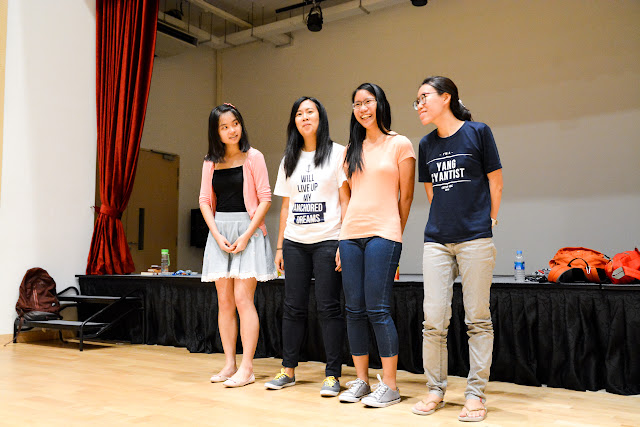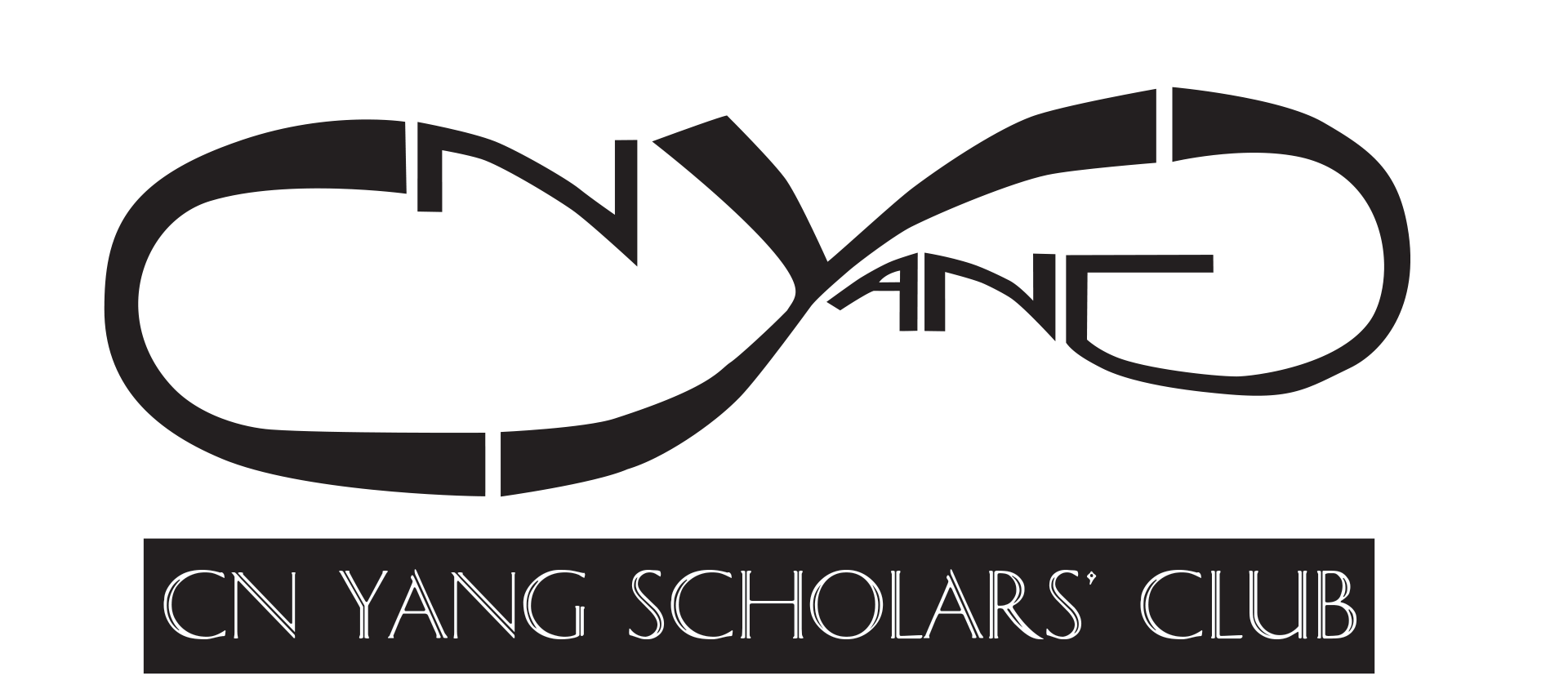[alpine-phototile-for-picasa-and-google-plus src=”user_album” uid=”117382818726251679027″ ualb=”6214434226863704257″ imgl=”fancybox” style=”wall” row=”4″ size=”400″ num=”8″ shadow=”1″ highlight=”1″ align=”center” max=”100″]
As the first semester draws to a close, the CN Yang Scholars’ Club would like to take some time to reminisce about our experiences with the club. University extends beyond books and examinations, and on the 21st of October this year, we had a taste of improvised acting. In this installment, Zaki will bring you through his journey on The Improv Way: Teamplay.
The Improv Way: Teamplay
BY ZAKI
On a supposedly uneventful Wednesday evening, the Holistic Development portfolio invited two trainers, Hazel and Kim, from the Improv Company to give our fellow scholars a little taste of improvised acting.
 From left: Hazel and Kim from the Improv Company
From left: Hazel and Kim from the Improv Company
Improvised acting, as the nomenclature suggests, involves acting without a script. Improvised acting is an art made popular by the series “Whose Line Is It Anyway”. In improvised acting, participants will be given themes and other rules where they will perform them almost immediately.
The Improv Company had its humble beginning as an alumni group of NUS Stage’s Improvables in 2013. However, they began holding workshops, lessons, and monthly performances to share their love for the art, and is now Singapore’s only specialised improvised acting theatre company.
After a light warm-up session to release some latent energy, Hazel and Kim shared the three main principles that encapsulated the entire art of improvised acting. First was the principle of “Yes and…”. Participants often perform in a group, where people can contribute to varying extents with a leading role that frequently changes hands. A “yes and…” attitude does not denote blind following. It is about adding value when one contributes. This leads us to our second principle – making your partner look good. Somewhat a corollary of the first principle, one should not ultimately reject the ideas from other participants. It compels us to come to terms with the diversity of perspectives and ideas, which may be totally alien to our own. Participants need to learn how to improve on the ideas of others, and not just reject it and impose their own interpretations.
The last principle is the essence of the whole enterprise of improvised acting and maybe even life – the zeroth law of improvised acting may I say – to embrace uncertainty. As there is no material or written script, one must be accustomed to the inherent uncertainty. No two stories are the same, and stories with the same themes, possibly even same participants, may diverge. No safety net is available should one run out of ideas. Thus, improvised acting throws participants out to the unknown, where anything goes. The last principle behoves us to step out of our comfort zone. Whatever inspiration available, participants should be able to manipulate it for the performance. Thus, confidence in oneself, as well as one’s partners, is key.
One thing I noticed when entering the function hall was the lack of chairs. Apart from a table at the back for refreshments (Polar cakes! Yay!), the whole hall was devoid of furniture and Ikea. With CY1500 still fresh in my head, having a function hall without the orderly rows of chairs was quite unfathomable. However, this workshop was not the typical sit-in seminar where one pretends to be taking notes while browsing through Facebook.
The workshop required no chairs. All participants were on their feet and around the function hall. In fact, the only material we needed was our imagination! After a brief introduction, the trainers immediately led us through a journey in the art of improvised acting.
It was a journey full of innovation and wonder. At every turn and activity, we were left amazed by the wit and humour of our fellow peers. Throughout the different activities, we gradually comprehended the 3 principles through active involvement.
 And the journey ends… you can see the horse carriage ready to embark on the road ahead, although there was an obstacle (perhaps a log) for the horse.
And the journey ends… you can see the horse carriage ready to embark on the road ahead, although there was an obstacle (perhaps a log) for the horse.
The journey was not to say, easy. Sometimes, we could be at loggerheads trying to find a resolution. In one of the activities, each pair had to plan a birthday party for a mutual friend. It was tough, especially when we were constrained by the rule to initiate every response with a “No, and…”. For instance, I suggested cake. However, my peer informed me that our dear friend did not like cake. Oh, bother! However, the response rule was amended to “Yes, but…” and then to “Yes, and…” where our discussions became gradually more constructive. In the end, my pair managed to plan a birthday party on the moon.
Furthermore, during our journey, we had to consult the wisdom of the “Oracle”. The “Oracle” was a row of four individuals who would contribute word-by-word to answer a question posed. We asked the crucial questions as well as trivial ones to test our clairvoyants. “Why do we need to study?” an inquisitive soul dared asked. The “Oracle”, quick on their tongues, promptly replied: “Tomorrow. You. Will. Know.” Such prophetic quip! Besides that, we assessed the “Oracle” on trivia. “Why is the Earth round, not square?” to which they responded “Circle. Is. The. New. Square.”
 One of our oracles awaiting questions from the floor
One of our oracles awaiting questions from the floor
Yet, we still had time to recall our sweet memories of the past. A group of participants were assigned to relate to the CERN trip during the summer break. However, as we did not prepare any material, (it was improvised!) they had to recruit other scholars to recreate various scenes and images photographed during the trip. In one of them, the group recreated the scene of the classroom during one of the talks there. Although there was a lack of furniture in the created still, the expressions on their faces related to the confusion and jet-laggedness back then.
 A recreated scene of the lectures in CERN
A recreated scene of the lectures in CERN
Through these activities and more, participants became involved in the appreciation of improvised acting. The 3-hour session was lively, with participants having impassioned conversations with one another to conducting PT sessions due to a game variant, and to “Simon Says”.
As the English playwright William Shakespeare once said, “The world’s a stage, and the men and women merely players.” Practitioners of improvised acting take that line literally – the stage spans beyond four walls, their materials not limited by space and time. Verily, the art embodied the joy of living – to affirm triumphantly the unknown around us and within us.

